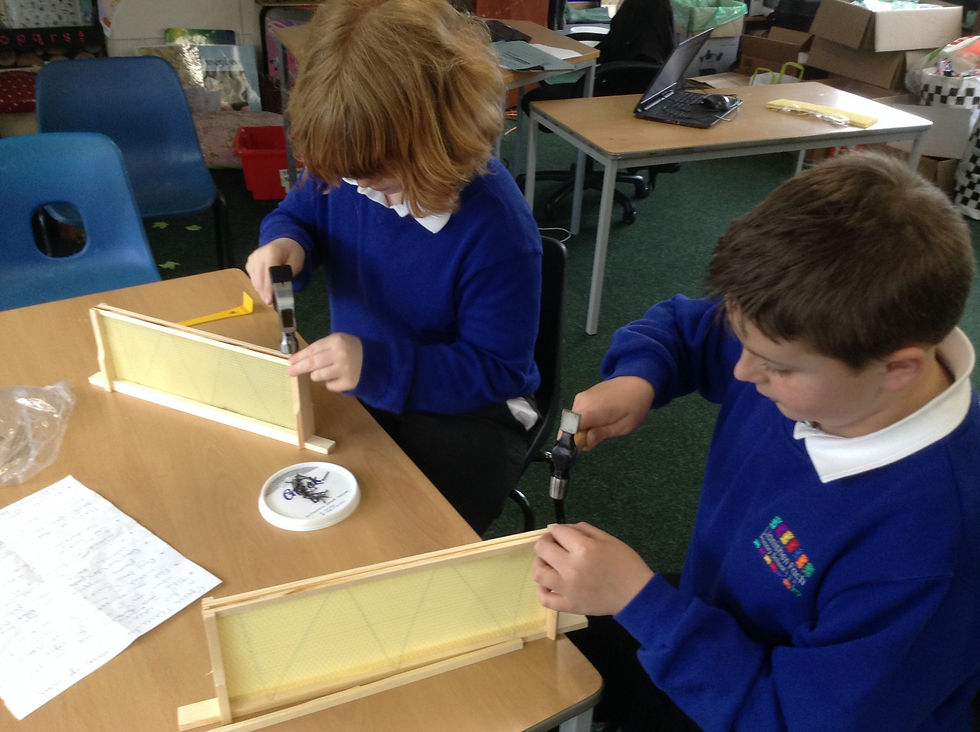Beekeeping in schools
Are you an educator?
Are you looking for a minibeast resource that links to the curriculum for Wales?
Everything but the Bees project
We have created a useful FREE resource for school staff and educators with many website links and information about honeybees including fun facts, games and activities.
We have put together an ‘Everything but the Bees’ resource box full of equipment and resources for you to borrow. Please contact louise@cardiffbeekeepers.co.uk to arrange the collection of the kit.
What is in the kit?
* A selection of fiction and non-fiction books
* Children-size bee suits and equipment
* Games and activities
* A jar of honey to taste
NOTE
The kit must be picked up from CF5 6LW
The kit is loaned for one week only
Any breakages or losses MUST be paid for or replaced.
"The everything but the bees' boxes were a huge success! We spent the whole rest of the day exploring the resources and have been since! They particularly enjoyed the costumes and the equipment so they could role play being a beekeeper! The samples of honey and beeswax also particularly caught their attention as well as the books! I would definitely recommend these to other schools/groups."










Photos from a recent school visit.
Honeybee hives in school
I am regularly asked about keeping honeybees in school. I usually respond by saying that it is a great idea and will offer the pupils many opportunities for learning about bees and other pollinators, pollination of plants, livestock management, building life skills and working together as a team
There are many more positives too.
I always suggest a school starts with planting for pollinators on their school grounds first though. The more forage there is around for the honeybees, the more successful they will be and you will be supporting other pollinators as well, which is an added bonus.
However, establishing an apiary can be a lot of work for school staff and there are many other points to consider.
You will need a minimum of 2 committed staff who will train as beekeepers.
Honeybee hives need weekly checking from April to October so will need care during the school holidays and possibly in the evenings or at weekends if the weather during the working week hasn’t allowed for inspections.
You will need training and support from your local beekeeping association. We provide an
introduction to beekeeping course annually for a fee. It is a good idea to have a mentor, an
experienced beekeeper whom you can ask for assistance and queries.
Is your site suitable for beehives? Is there enough space away from the school building, neighbours and local buildings? Is the site secure and safe from vandals and thieves? Do you have storage space for the equipment?
There is a set-up cost to beekeeping. Hives – £200+ each, bees – £200 per colony, suits – £100 for an adult suit etc. This can be a significant amount of money and there will be ongoing costs for equipment every year. Do you have funding? Can you apply for a grant?
Risk assessments and safety procedures will need to be in place. The apiary will need to be
maintained – grass cut, brambles cut back etc.
Insurance for the honeybees, public liability and bee disease insurance will be required. You must speak to the insurance department of your Local Authority to say you are planning to have honeybees onsite.
Will the headteacher be supportive? What will other school staff and parents/carers think? Will they be happy?
You will need a plan for how you will include the pupils and school staff in the honey bee
management and take advantage of the learning opportunities they can all benefit from.
Swarms will be an annual event regardless of how well you manage the bees, they will do what they want to do and it is their natural instinct to swarm. You will need to be prepared for these and take action immediately.
Cardiff Beekeeping Association – chair@cardiffbeekeepers.co.uk
As well as the videos above, Maddie has made a CBBC programme where five wanna-bee beekeepers compete in the UK’s first-ever beekeeping challenge.
https://www.bbc.co.uk/iplayer/episodes/m00103ly/show-me-the-honey
BBC programme – What’s in your bag? – The beekeeper – with local beekeeper Gruff who shows the children why it is important to wear a veil when working with his bees.
https://www.bbc.co.uk/iplayer/episode/m001lcyx/whats-in-your-bag-series-1-6-beekeeper
If you would like to find out more about keeping bees in school, please look at the following links, there's loads of resources therelinking to different areas of the curriculum:
Bees in the Curriculum | British Beekeepers Association (bbka.org.uk)
Understanding bees – IBRA Primary Education Pack | Teaching Resources | Countryside Classroom
Would we starve without bees? – BBC Teach
Bees | Lesson Plans for Teachers | Young People’s Trust For the Environment (ypte.org.uk)
https://www.woodlandtrust.org.uk/blog/2019/05/types-of-bee-in-the-uk/
http://www.sussex.ac.uk/lasi/resources/education/teachersarea/primaryschool
https://www.stem.org.uk/resources/elibrary/resource/28763/bee-scene
https://www.bumblebeeconservation.org/
https://www.rhs.org.uk/science/conservation-biodiversity/wildlife/plants-for-pollinators
Bee Playdough Stamps | PuzzleBug
The Amazing Honey Bee | National Agriculture in the Classroom









